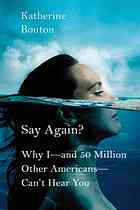
Shouting Won't Help
Why I--and 50 Million Other Americans--Can't Hear You
فرمت کتاب
ebook
تاریخ انتشار
2013
نویسنده
Katherine Boutonنویسنده
Katherine Boutonشابک
9781429953375
کتاب های مرتبط
- اطلاعات
- نقد و بررسی
- دیدگاه کاربران
نقد و بررسی

October 29, 2012
Though she’s never been able to pinpoint the cause of her affliction, former New York Times senior editor Bouton remembers the day she began to lose her hearing and suddenly found herself among the ranks of the estimated 275 million people around the world with some type of hearing impairment. She recounts her story and expands it to include the experiences of others (each chapter closes with a profile of a person with a hearing disability, including a British opera singer, a psychoanalyst, and a professor), crafting a study rich in detail and broad in scope that touches on the intricacies of cochlear implants and the increasing amount of ambient noise in our society, as well as the shame, frustration, and guilt the hearing impaired face in the workplace and in private conversation. This 360 degree approach to the topic makes this more than just a memoir; it’s a unique method of storytelling that educates, engages, and occasionally enrages the reader, who will come away with a new understanding of the widespread and often puzzling topic of hearing loss and how it can be overcome, or at least managed. Agent: Jim Levine, Levine Greenberg Literary Agency Inc.

Starred review from December 15, 2012
A former New York Times senior editor's poignant, enlightening memoir of hearing loss. Hearing impairment is a widespread, and widely misunderstood, condition that afflicts nearly 50 million Americans. With ever-specialized medical technology and increasingly precise diagnostic tools, treatment options are better than ever, but the nature of damage to the inner ear remains opaque. In addition, in a culture dominated by oral communication, a persistent stigma remains attached to going deaf and to its prosthetic aids. Where hearing loss was once associated with the elderly, statistics suggest that an increasing number of young people put themselves at risk for early damage by exposure to overloud music, sports arenas, even subway stations. Bouton, whose own hearing loss has no known cause, details her struggle to accept the disability and to navigate the complex physical and emotional changes that accompany the inability to hear well. Vanity considerations aside--most hearing aids have an exterior element, drawing visibility to an otherwise invisible condition--the decision to wear a hearing aid or to have surgery to install a cochlear implant has financial and psychological ramifications. Most insurance companies don't cover all costs related to hearing loss, and often such devices don't work right away or even at all. Vertigo, tinnitus and depression are also common side effects of hearing loss or surgery, and the small adjustments and audio therapy required to get devices to work can take years. By interspersing her story with those of many others--both those suffering with hearing loss and the medical experts working to find a cure--the author provides a relatable, inspiring narrative of taking control, going public and finding comfort and empowerment in connecting with others facing similar difficulties. A well-written, powerful book.
COPYRIGHT(2012) Kirkus Reviews, ALL RIGHTS RESERVED.

May 15, 2013
Why do we lose our hearing? Although this is a simple question, Bouton (former senior editor, New York Times) discovered that the answer is complicated. This book is borne out of Bouton's desire to find out why she started losing her hearing in her thirties; the progressive loss eventually forced her into retirement from a successful job with the Times. The book is well researched, with chapters focusing solely on hearing aids, cochlear implants, and the science of hearing. She explores new treatments and research and even analyzes the effects of noise on society. The most fascinating sections are the "Voices" at the end of each chapter, where Bouton details the experiences of fellow deaf people. Many of them are involved in the theater, as conductors or opera singers, and their careers were affected drastically by their loss. Bouton also relates how she slowly lost her hearing and came to terms with her disability, a process that took her years. VERDICT Both deaf and hearing readers will find Bouton's research interesting and informative, though they may disagree with her conclusions.--Caitlin Kenney, Niagara Falls P.L., NY
Copyright 2013 Library Journal, LLC Used with permission.

Starred review from December 1, 2012
According to the latest statistics, 48 million Americans, or a whopping 17 percent of the population, have some kind of hearing loss. Bouton, a former senior editor at the New York Times, is one of those people. In her compelling memoir, she chronicles her own progressive loss over the decades, from a partial decline in her left ear at 30 to eventual complete loss. Hearing loss, she says, follows the traditional stages of grief: denial, anger, depression, and, finally, a reluctant acceptance. And, she notes, it affects people of all ages, not just the elderly. Employing an engaging and even entertaining writing style, Bouton discusses the causes of hearing loss, the often horrendousand ubiquitousnoise levels that surround us in the modern age, the ongoing stigma associated with hearing loss, the benefits and disadvantages of hearing aids and cochlear implants, the psychological impact of hearing loss, the lack of insurance coverage for hearing aids, and the debilitating toll that hearing loss can take in the workplace. In addition, she examines the condition's ugly stepsisters, tinnitus and vertigo, before concluding on an encouraging note about ongoing research for a biological cure. Each chapter includes short profiles of people with hearing loss. An important and remarkable book.(Reprinted with permission of Booklist, copyright 2012, American Library Association.)

























دیدگاه کاربران